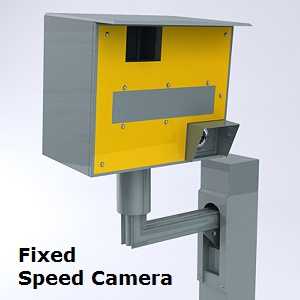FIXED SPEED CAMERAS:
As a rule, fixed speed cameras are yellow boxes mounted on a grey pole. Motorists will see them as a permanent fixing at selected roadside spots.
Speeding too fast is dangerous! In fact, driving above the national speed limits is against the law. The most vulnerable areas of busy streets and highways will have a fixed speed camera.
The police use speed cameras as traffic calming measures. They also use them to catch and prosecute speeding motorists.
In the 1960s the first speed cameras used film to capture an image. The modern digital version replaced them in the 1990s.
Since then, motorists have circulated rumours and myths on the use of speed cameras. They have speculated on whether they actually work or not. Some drivers are still convinced there are ways to avoid getting penalty points on a licence.
Unusual and illogical things often get said about speed cameras and speeding. So here are seven facts about speed cameras with expert answers of ‘true or false‘ to the claims.
Note: ‘Brake’ is a road safety charity in the United Kingdom. They are working to stop road death tragedies and injuries. Much of the factual information on speed cameras comes from their annual reports.
1. Not all Speed Cameras are Switched On
In fact this is true!
This information comes from research discovered in Freedom of Information requests. The outcome reveals that some speed cameras are not switched on – thus not operational.
All road safety organisations support the use of traffic calming measures. Even though some speed cameras are switched off, they hope for a time when all cameras get turned on.
Speed cameras reduce speeding and save lives. They trap a very high number of speeding motorists. In fact, fixed speed cameras catch a lot more speed demons than traffic police mobile cameras.
2. Driving Fast doesn’t Trigger the Camera
In fact this is false!
Not only are these rumours about speed cameras false they are also complete nonsense. There is only way to avoid triggering the camera – drive within the speed limit!
3. Only Yellow Speed Cameras are Legal
In fact this is false!
The Government want yellow boxes for all speed cameras in England. Even so, getting trapped by a grey device before that becomes law is tough – but legal and valid.

4. You need to Speed 10% of the Limit Plus 2mph to get Caught
In fact this is false (sort of)!
UK driving laws state that motorists can get a speeding ticket any time they exceed the speed limits on a road. Those rules apply even if the excess speed is only 1mph over the limit.
But, the NPCC National Police Chiefs Council provides further guidance on this matter. They suggest speeding prosecutions only go ahead if a driver exceeds the speed limit by 10% plus 2mph.
We also busted the myth about ‘average speed cameras‘. Many motorists think they do not work and choose to ignore them. In fact, they do work and they prevent dangerous driver behaviour.
Average speed cameras enforce limits over longer stretches of roads. They deter law-breaking drivers from speeding up after passing a fixed speed camera.
5. Notification must occur within a Certain Time to be Valid
In fact this is true!
Drivers caught by a speed camera must get a Notice of Intended Prosecution within 14 days. The NIP notice gets sent to the DVLA registered address of the vehicle caught speeding.
6. Drivers can Request a Speed Awareness Course
In fact this is false!
The police will notify anyone who is eligible to attend a speed awareness course. But, it is true that you can do more than one speed awareness course.
If you get caught speeding for a second time you may be able to take a second course. As a rule it depends on the severity of the offence committed. But, guidelines say it cannot be within 3 years of the first declared speed awareness course.
Note: You will need to declare a speed awareness course attendance on your insurance. Failure to do so may result in an invalid insurance policy at a later date. Local police forces hold information about drivers who have attended courses.
7. UK Speed Cameras can Catch You on a Horse or Bicycle
In fact this is false!
It is very unlikely that cyclists or horse riders on the road can reach speeds that would exceed the limit. But, road speed legislation relates most to motor or mechanically propelled vehicles.
ALSO IN THIS SECTION
Articles about Health and Safety: All the top stories on health regulations and safety rules.
Deadly Electric Cars: GDBA prompts a major new ruling towards all electric and hybrid vehicles.
Highway Code Rules: Essential reading for all vehicle drivers, motorcyclists, and other road users.
UK Speed Limits: The speeding maximums that apply for safe motoring in ‘optimum conditions’.

